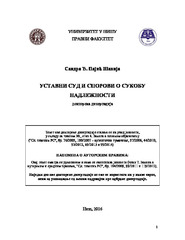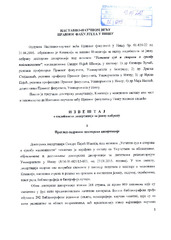Приказ основних података о дисертацији
Ustavni sud i sporovi o sukobu nadležnosti
| dc.contributor.advisor | Pejić, Irena | |
| dc.contributor.other | Vučić, Olivera | |
| dc.contributor.other | Stojanović, Dragan | |
| dc.contributor.other | Nastić, Maja | |
| dc.creator | Pajić-Šavija, Sandra Đ. | |
| dc.date.accessioned | 2019-05-30T12:57:35Z | |
| dc.date.available | 2019-05-30T12:57:35Z | |
| dc.date.available | 2020-07-03T16:11:08Z | |
| dc.date.issued | 2016-11-25 | |
| dc.identifier.uri | http://eteze.ni.ac.rs/application/showtheses?thesesId=6695 | |
| dc.identifier.uri | https://nardus.mpn.gov.rs/handle/123456789/11154 | |
| dc.identifier.uri | https://fedorani.ni.ac.rs/fedora/get/o:1574/bdef:Content/download | |
| dc.identifier.uri | http://vbs.rs/scripts/cobiss?command=DISPLAY&base=70052&RID=1027341473 | |
| dc.description.abstract | This dissertation treats the competence of Constitutional courts in settling the disputes of jurisdictional conflicts, both in theoretical and historical as well as practical, sense. It is common knowledge that the Constitutional court is the most efficient mechanism for protecting the constitutionally determined separation of power. The role of the Constitutional Court is especially significant with regard to the fact that the separation of power does not exclude the possibility of interweaving jurisdiction of different levels of state power. By settling disputes of jurisdictional conflicts, the Constitutional Court gains competence for the determination of clear boundaries of state power organs in terms of their constitutional authorisation. Given the fact that the jurisdictional conflict is mainly motivated by political agenda, the Constitutional Court must settle an originally political dispute by implementing the constitutional norms. The jurisdictional conflicts are a common competence of Constitutional courts. They are a direct representation of the government, or the constitutionally determined separation of power. A distinction between horizontal and vertical disputes can consequently be made. Various factors cause these disputes, including the following: state power, government, political parties system, level of democratic development, the level of precision of constitutional norms determining the boundaries of state power, etc. The constitutional disputes of jurisdictional conflicts should, however, be thought of in a broader sense as well. The Constitution commonly views these disputes as a separate jurisdiction of Constitutional courts. If the disputes of jurisdictional conflicts are regarded as a factual violation of constitutionally proclaimed separation of power, then the other constitutional disputes can be seen as an infringement of the power separation principle as well. In that way the Constitutional court indirectly settles a competence dispute while simultaneously carrying out normative control, its basic duty. Assuming that the separation of power is based on the idea of preventing the abuse of state power by guaranteeing the fundamental rights and freedoms, one can say that, while deciding on the protection of rights and freedoms proclaimed by the Constitution, the Constitutional court indirectly protects the power separation principle. The matter of jurisdictional conflicts can decided upon by the court when the court is asked to give an interpretation of the constitutional provisions. If the fact that this jurisdiction is a necessary consequence of federal division of the state is exempted, one can say that in the countries without federal division the settling of competence disputes, also represents a separate jurisdiction of Constitutional courts. The guiding principle for all the countries was the fact that the abuse of power or the realisation of its separation (or balance) can only be reached through the operating system of an independent and unbiased institution, as the Constitutional court itself is. An analysis of various countries’ Constitutions and the practice of Constitutional courts in settling competence disputes has shown that Constitutional courts have made a significant contribution to the realisation of power separation, especially in the transitional processes of non-democratic regimes to democratic ones. Naturally the real effects of the constitutional jurisprudence depend on the political climate-the relationship between the political institutions and the one these have with the Constitutional court, as well as their willingness to abide by its decisions-and this is a fact one should not neglect. | en |
| dc.format | application/pdf | |
| dc.language | sr | |
| dc.publisher | Универзитет у Нишу, Правни факултет | sr |
| dc.rights | openAccess | en |
| dc.rights.uri | https://creativecommons.org/licenses/by-nc-nd/4.0/ | |
| dc.source | Универзитет у Нишу | sr |
| dc.subject | Ustavni sud | sr |
| dc.subject | Constitutional court | en |
| dc.subject | power separation | en |
| dc.subject | jurisdictional conflict | en |
| dc.subject | horizontal disputes of jurisdictional conflict | en |
| dc.subject | vertical disputes of jurisdictional conflict | en |
| dc.subject | podjela vlasti | sr |
| dc.subject | sukob nadležnosti | sr |
| dc.subject | horizontalni sporovi o sukobu nadležnosti | sr |
| dc.subject | vertikalni sporovi o sukob nadležnosti | sr |
| dc.title | Ustavni sud i sporovi o sukobu nadležnosti | sr |
| dc.type | doctoralThesis | en |
| dc.rights.license | BY-NC-ND | |
| dc.identifier.fulltext | http://nardus.mpn.gov.rs/bitstream/id/54084/Pajic_Savija_Sandra.pdf | |
| dc.identifier.fulltext | https://nardus.mpn.gov.rs/bitstream/id/54084/Pajic_Savija_Sandra.pdf | |
| dc.identifier.fulltext | https://nardus.mpn.gov.rs/bitstream/id/54083/Disertacija.pdf | |
| dc.identifier.fulltext | http://nardus.mpn.gov.rs/bitstream/id/54083/Disertacija.pdf | |
| dc.identifier.rcub | https://hdl.handle.net/21.15107/rcub_nardus_11154 |



